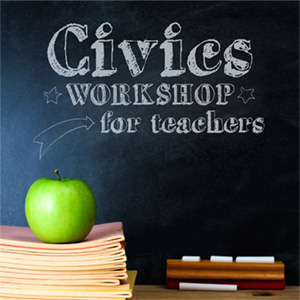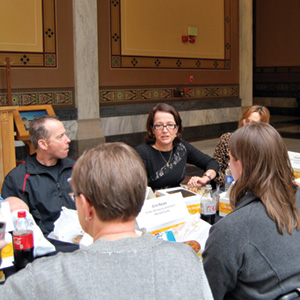 Surveys, talk show hosts and the nightly news remind us that American students are woefully uninformed about even the most basic functions of our government. While no one group or organization can solve this problem on its own, the Indiana Supreme Court—through its “Courts in the Classroom” (CITC) outreach project—is doing its part by hosting workshops for Indiana teachers on the operation of Indiana’s judicial branch. Since 2008, approximately 363 teachers from around the state have participated in these workshops.
Surveys, talk show hosts and the nightly news remind us that American students are woefully uninformed about even the most basic functions of our government. While no one group or organization can solve this problem on its own, the Indiana Supreme Court—through its “Courts in the Classroom” (CITC) outreach project—is doing its part by hosting workshops for Indiana teachers on the operation of Indiana’s judicial branch. Since 2008, approximately 363 teachers from around the state have participated in these workshops.
In the early years, teachers registered for the workshop through Indiana University Purdue University at Indianapolis (IUPUI) and received graduate credit after completing a two-week course held during the summer. In an effort to reach more teachers and students, three years ago the format changed to a one-day workshop in the spring focused on a single topic. With a shrinking summer break and changing requirements for teacher licensing, this proved to be a popular alteration.
To reach a statewide audience, Indiana trial court judges nominated outstanding teachers in their counties. Some judges already knew local teachers, but others asked principals, superintendents, and even their kids for the names of educators to nominate. This year, judicial officers and representatives from other legal organizations nominated 131 teachers representing 36 different counties. Eighty-six were able to attend the workshop held on April 10, 2014.
In 2012, the one-day workshop introduced teachers to iCivics.org. iCivics is the brainchild of retired U.S. Supreme Court Justice Sandra Day O’Connor. It is a free computer-based collection of interactive simulations that teach students not only about the judiciary, but also the workings of the legislative and the executive branches. The website includes lesson plans aligned to individual state standards.
In 2013, CITC partnered with the National Center for State Courts (Center) to provide conference participants with classroom sets of the Center’s graphic novels that illustrate a variety of law-related topics. The Center has novels and supporting teaching materials covering jury service, identity theft, and Internet piracy. The workshop focused on jury service and included a voir dire simulation with the attendees. This simulation is now offered by CITC as a field trip opportunity for Indiana teachers and will be featured as the Court’s Constitution Day activity for 2014. There will be a training session at the Fall Judicial Conference for interested judicial officers.

This year’s workshop focused on providing teachers with content knowledge instead of specific lesson plans. Participating educators were introduced to specialized courts and court projects that they might not normally include in their lesson materials. With this in mind, sessions led by judges and lawyers focused on problem-solving courts (Floyd Superior Judge Maria Granger and Marion Superior Judge Jose Salinas), juvenile and family issues (Marion Superior, Juvenile Division, Judge Beth Jansen and Henry Circuit No. 1 Judge Mary Willis, and State Court Administration Staff Attorney Michael Commons), and a primer on the appellate process (Indianapolis attorneys Jon Laramore and Rick Shoultz).
Participants also had an opportunity to talk with court staff involved in programs that might be of interest to teachers: GAL/CASA, the Judges Speakers Bureau, ICLEO, Parenting Time Guidelines, the Court Interpreter Program, and Indiana Court Times.
Following the concurrent sessions, participants attended the McIlquham v. State oral argument in the Supreme Court courtroom. The case involved an unsupervised toddler who wandered out of an apartment and the resulting 4th Amendment search and seizure question. The topic was well-suited for teachers to easily integrate into their classrooms. Some teachers have already incorporated it into their course content. David Rodgers from Zionsville High School told us how it fit into his class: “[I] wanted to thank you again for putting together yesterday’s events. I thoroughly enjoyed the opportunity [to observe the oral argument], and have already had some good discussions with my AP U.S. History classes about the case we heard. Today’s class topic is the Warren Court and its extension of rights of the accused. A perfect fit!”

Between the working sessions and the oral argument, the teachers had plenty to talk about. They enjoyed lunch in the atrium on the fourth floor of the Statehouse with members of the Court and some of the speakers from the morning session as well as Lilly Judson and Dave Remondini (State Court Administration), and Jane Seigel (Judicial Center).
When commenting about the workshop in general, one teacher said, “Just as our students benefit from hands-on learning, so do we. It was excellently planned and managed. The learning experience was better than a college class.”
The program concluded with a session on media coverage of the courts. In recognition of the wide-ranging ways we now access the news, press representatives from print, television, and the Internet spoke to the teachers. Tim Evans (Indianapolis Star) represented traditional newspapers, Drew Blair (WISH TV) talked about television coverage, and Abdul Hakim Shabazz (political commentator) spoke on use of the Web. The Web isn’t just for bloggers anymore. Evans and Blair both discussed how their job has changed because of requirements to constantly post updates on the Web and how they balance this pressure while inside courtrooms that often restrict access to electronic devices.
Just getting to a workshop is often a challenge for teachers. Some teachers had to use personal leave, others had to pay their own costs, or even help cover the cost of paying a substitute teacher. Yet, they still came. Kyle Hall from New Castle Middle School has attended all three one-day workshops. He wrote to tell us that he “looks forward to this professional opportunity every year…It is very informative and gave me several ideas to use in my own classroom.”
When asked in an online evaluation about the day, more than 90% of the participants said that they found the experience valuable and would recommend the workshop to other teachers. David Utterback from Terre Haute sent an email to the judge who nominated him, Vigo Superior Court Judge John Roach, writing that “in thirty years of teaching and attending conferences, the April Civic Education conference was one of the best I’ve ever attended.”
Why should the courts continue to invest time and money in this sort of program? As a result of this one-day outreach, about 14,000 Indiana students have teachers who now are better informed about how the courts work and about some of the ways courts are trying to help offenders become productive members of their local communities and our state.
As one teacher put it, “Thank you so much for all of the work to make this a great day for the teachers present. It was one of the best experiences of my teaching career. The opportunity to hear directly from lawyers/judges, sit in on the oral argument, and then the honor of eating lunch WITH the justices was second to none. We were made to feel very welcome and important, which we appreciated.” Or as another participant put it more concisely: “I had fun, became a better citizen and teacher, and met amazing people.”
For additional information on Courts in the Classroom or Teacher Workshops, please contact Elizabeth R. Osborn, Ph.D. at 317-233-8682 or [email protected].
Cover photo @iStock.com/franny-anne